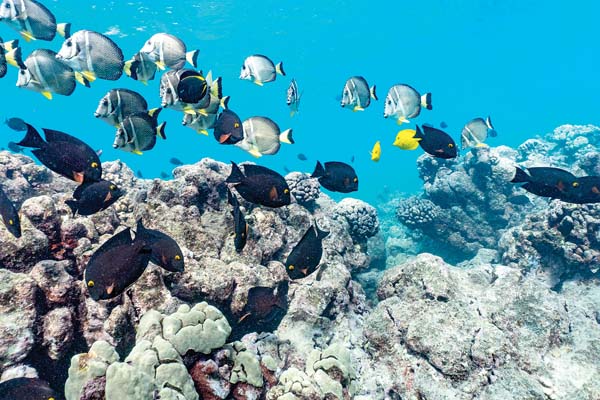Reef fish are integral to ocean ecosystems because they feed on algae and prevent them from taking over corals. Photo courtesy DLNR
State officials are seeking input on proposed fishing rules for reef fish, which play an integral role in oceans by helping prevent algae from taking over corals.
Herbivorous fish that live among reefs, including uhu (parrotfish), kala (unicornfish), manini (convict tang), kole (goldring surgeonfish) and others, primarily feed on algae or plant material, which helps prevent algal populations from overgrowing and overtaking marine organisms such as corals, according to the state Department of Land and Natural Resources. Keeping algae in balance also allows space for corals to settle and grow, contributing to reef recovery and resilience in the face of climate change and other threats.
DLNR’s Division of Aquatic Resources is holding a series of meetings this month to discuss proposed amendments to fishing rules for reef fish, starting with a session from 9 to 11 a.m. Saturday, 12 to 2 p.m. Monday and 5:30 to 7:30 p.m. Wednesday.
Herbivore stocks in Hawaii are depleted compared to past levels, according to DAR. Limiting the number and/or size of fish caught at one time can ensure enough food for communities and enough fish to protect the reefs.
The initiative is part of a broader herbivore management strategy and is described in the DAR Sustainable Herbivore Management Plan, released recently. Key actions in the plan include implementing both place-based and statewide regulations to promote sustainable fishing practices, enhance monitoring efforts to track changes and evaluate effectiveness of management measures and collaboration with partners to better address land-based impacts.
To read the plan, visit dlnr.hawaii.gov/marine30x30/.
For more information or to provide comments, visit dlnr.hawaii.gov/marine30x30/herbivoremanagement/participate-in-the-process/ or send comments by mail to 1151 Punchbowl St., Room 330, Honolulu, HI 96813 or by email to [email protected].


